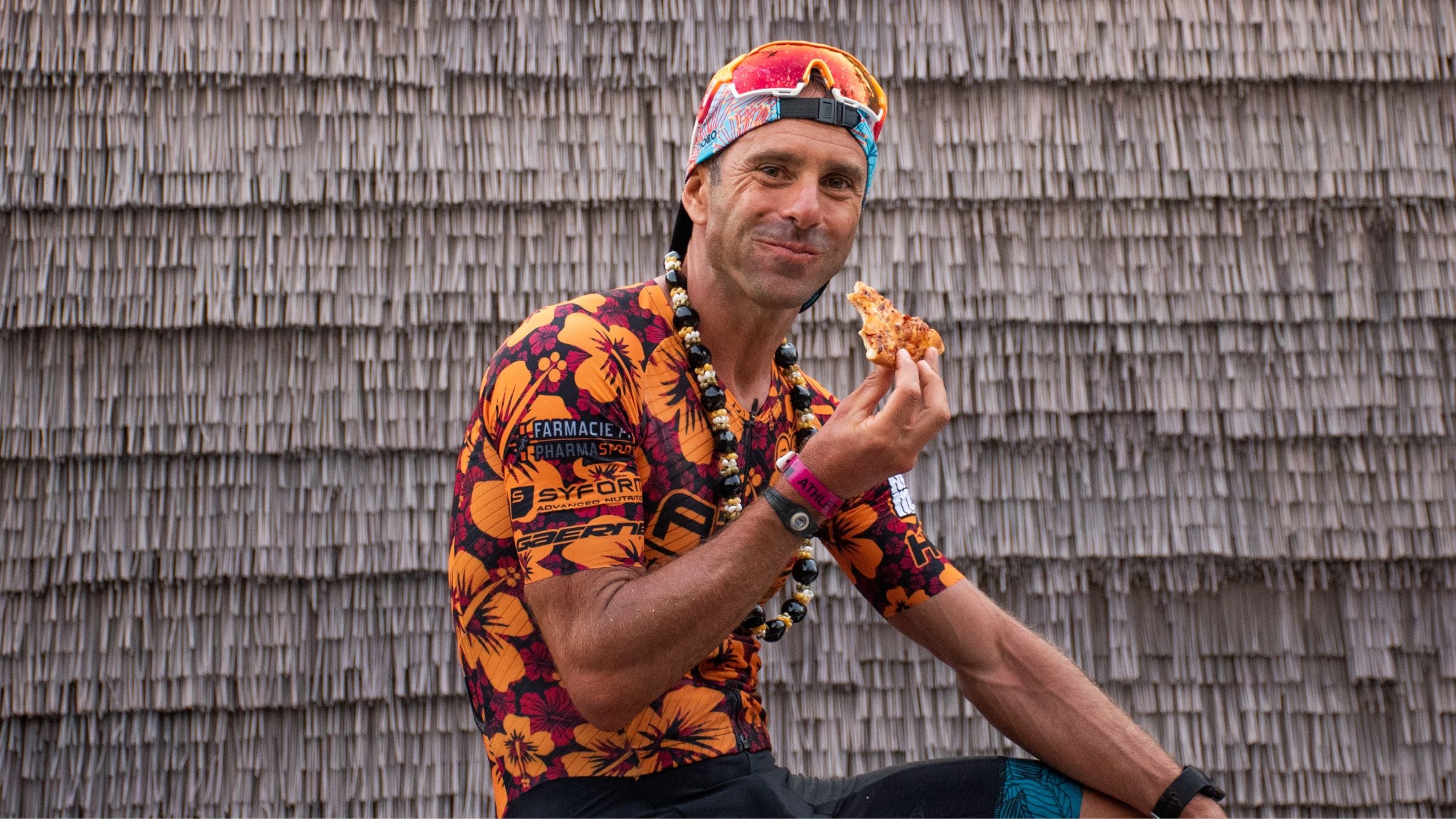Why You Might Want to Rekindle Your Relationship With Carbs

(Photo: Hannah DeWitt/Triathlete)
Mika Severinsen, a 42-year-old triathlete and graphic designer, assumed that her glum mood was because she had to return to an office setting in the post-pandemic era. However, when she found that it was actually enjoyable to get out of the house and collaborate with coworkers in real-time, it was clear that something else must be off. “I had headaches and this awful sense of dread when I woke up in the morning. If anything went wrong during the day, I would get so upset.” She had enough energy to work and train, but her workouts were lackluster and only compounded her sadness. “I just felt dull, like I was getting nowhere with anything. I never connected it to my diet.” A chance chat with a registered dietitian she met through a friend got her thinking. She’d been experimenting with lowering the amount of carbohydrates in her diet, though she was careful to not restrict calories, to see if she could force her body to burn more fat for fuel. “I didn’t notice any difference in my training, but I did find my clothes fitting differently, so I figured it was a win. Nothing is worth feeling that down, though.”
Triathletes are some of the most inquisitive and interested folks around, often eager to learn about new training techniques, equipment, and even diets. If it helps us perform better, we’re into it. However, like Mika, we don’t always consider the psychocognitive effects of something like a low carbohydrate diet (LCD) and may be surprised when we find ourselves struggling with depression, irritability, or even memory issues. In a world where pressures and stress seem to multiply by the minute, is it time to bring back the bagels?
What defines success on a low-carbohydrate diet?
Athletes choose to cut carbohydrates in their diet for different reasons, but they don’t always think about the repercussions. Some are trying to tap into their fat stores for fuel with the idea that they will have plenty of energy for long hours of training. Others are trying to cut weight and body fat, believing that this will also give them a competitive edge or aesthetic benefit. In both cases, athletes are looking for physical, usually data-driven results of the diet that we can clearly appreciate like lower numbers on the scale or quicker times on the bike. We don’t typically think about the fact that the LCD can also bring about changes to other areas of our non-training lives from not having enough of the right kind of fuel for the brain to function properly. Even if we are eating adequate calories and are not in overall energy deficit, we can still experience detrimental effects from a lack of adequate carbohydrate. Research on brain metabolism shows that we may struggle with many psychocognitive tasks like carrying out executive functions, accessing memory, processing emotions, neurotransmitter creation, even sensing the surrounding environment. If we’re dropping weight, but can’t ever remember where our wallet is, can we really say that we’re killing it?
A review of the scientific literature reveals plenty of evidence of the potential for negative psychological effects of an LCD. A group of high-trained cyclists were put on a high carbohydrate diet followed by a LCD (calories remained equal in both interventions), and then assessed for sleep, mood, and performance. The study showed that while on the LCD, the cyclists did not report poor sleep or poor performance, but they did report increased mood disturbance. In a 2018 case study of a world-class, long distance triathlete who went on an LCD with the same amount of calories as his normal diet, the subject reported that the new diet adversely affected his sense of wellbeing. He went on to clock his worst-ever half ironman performance after 21 weeks on the LCD.
A review on the long-term limitations of the LCD notes that adhering to the diet requires a significant amount of limitation and restriction of food choices, even if not a restriction of calories, that can have an effect on mental health over time. Yet another review article on carbohydrate intake, memory, and mood noted that in dietary intervention studies, the LCD was associated with increased anger, depression, tension and poor memory. A sweeping review in the journal Sports Medicine highlights the connection between sleep and mood, recommending that athletes take in carbohydrate-rich foods to sleep better and get to sleep faster. Finally, in a 2021 study of the effect of carbohydrate consumption on triathletes while training found that the mere presence of carbs in the mouth was enough to activate regions in the brain that induced both happy feelings and eventual better performance.
RELATED: Does Low-Carb Equal Low Testosterone in Men?
Public Enemy #1: Why do we still resist carbs?
It’s important to ask ourselves whether culture or physiology influences our choice to try the LCD. Registered Dietitian Kristen Screen says that carbohydrates have been villainized and misrepresented despite being the body’s preferred fuel source. Current opinion on carbohydrate intake is negative in general, according to reports, and it’s likely due to a combination of the public health efforts to educate people on “healthy” eating practices and also the glorification of fitness culture in the US. If we think this kind of information doesn’t affect athletes, we’re wrong since research on athletes’ attitudes toward carbohydrate intake showed that 44% of them chronically restrict dietary carbohydrate due to negative associations. A 2022 study of professional soccer players found that the players exhibited “carbohydrate fear” and in a scathing rebuke, stated that their behaviors were “exacerbated by external pressures arising from social media, key stakeholders (e.g., coaches) and the skinfold culture surrounding measurement of body composition.”
This toxic culture makes it even harder for athletes to recognize where and when the LCD might be failing them, often praising those who demonstrate the discipline to stick to a restrictive diet or discounting the importance of symptoms. They may tend to overlook more subtle clues that their body is not responding well to the LCD, according to Psychotherapist Stephanie Roth-Goldberg who frequently works with carb-resistant athletes. “Mood is one of the biggest parts of ourselves that is affected by low carbohydrate intake and yet one that is often ignored and blamed on other things. A big side effect of eating a low carb diet is being tired. In our society of being hyper productive we are often taught to ignore tiredness or ‘overcome it’.” She says that many athletes cling to ideas about what an athlete should look like or how fast they can get if they are leaner and may define their success on these concepts rather than whether or not they feel a sense of mental wellbeing or functioning well cognitively.
RELATED: Beyond Pasta: The New Rules of Carb Loading

How to push back against stigma and eat the damned pasta
It’s important to recognize that you can be carb-deficient, but not overall-energy-deficient and still experience any of the negative effects of an LCD. Screen confirms that she sees this all the time with her clients. “Athletes can be getting plenty of calories but still not meet their resource needs.” Some of the symptoms that we may experience from a lack of adequate carbohydrate will be fatigue, brain fog, chronic headaches, inability to meet training demands, that “running through mud” feeling, poor recovery, irritability, anxiety, and even strong food cravings or binge eating. The fix? We need to add in both starchy carbohydrates from grains and potatoes, plus plenty of fruits and vegetables. But first– let’s have a mouthful of truth.
Adding carbohydrates back into the diet can mean facing that bad reputation that carbohydrates have erroneously earned. Unfortunately, some athletes may see the inclusion of carbohydrates into their diet as some kind of failure or weakness and have to challenge their irrational rejection of a necessary macronutrient. Roth-Goldberg suggests that those athletes spend time unpacking that resistance since it can often center around body image. “A lot of the stigma that comes up around carbs has to do with weight gain which people fear because they place too much value on their bodies instead of inherent self-worth.”
Other athletes may think that adding carbohydrates back into the diet will make them crave more carbohydrates, but the research does not confirm this. A study of how carbohydrate intake influences subsequent food choices showed that eating carbs actually delayed the next meal and no increase in carbohydrates was noted. As for fat adaptation, again, the research does not confirm performance benefits. The effects of a low carbohydrate diet on elite endurance athletes was studied in race walkers where it was found that although fat oxidation increased, it actually led to poorer economy since the body needed more oxygen to execute movements. Fat adaptation, even if you’re able to achieve it, doesn’t necessarily lead to better performance.
Finally, some athletes may dislike some of the temporary water retention that can come with the reintroduction of carbohydrates back into the diet. This may again be rooted in concerns about weight and body image, a fear that deserves to be challenged according to both Screen and Roth-Goldberg.
Remember that what you choose to eat, or not eat, doesn’t make you a better person. Your hippocampus doesn’t care if you feel a sense of pride in cutting carbs and your neurotransmitters are not interested in losing body fat. If you think you are letting fears and myths get between you and a carbohydrate-rich diet, seek out the advice of a registered dietitian or even a psychologist who can help you challenge your assumptions. Nutrition is only successful if it supports the whole person–body, mind, and plate.
Worried about adding carbs? Don’t be.
Registered Dietitian Kirsten Screen explains what you need to know about reintroducing carbs to your diet.
“If someone has been avoiding carbs, reintroduction will cause some water retention. It’s super important that we keep this in perspective. This is extra water, not fat mass. Carbohydrates are stored in our muscles and liver (thankfully, otherwise we’d starve to death while sleeping) in the form of glycogen. This requires water, so if you’ve been avoiding them/restricting them for a long time, your body will fill its stores and hang on to water for a while. Keep hydrating well, make sure you’re getting your electrolytes, and give your body time. It’ll adjust in a few days.”“If you’re feeling sleepy or sluggish after carb ingestion, make sure you’re balancing your intake well. You should have carbohydrates, protein, and fat in all of your meals.”
“Some of your carbohydrates should come from starchy carbs (that’s bread, pasta, rice, etc), and some should come from color (fruits & vegetables). You need both because they serve different purposes.”
“Include some protein and fat to avoid huge blood sugar swings because these will make you sleepy, not because you’re afraid of diabetes. Carbohydrates, even starchy carbohydrates, do not ‘cause diabetes’ in metabolically healthy people.”
RELATED: High-Carb Fueling: How High Can You Go?
Jill Colangelo is a writer and researcher of mental health and ultra endurance sport. She has a BA and ALM in psychology and is a former triathlete and ultramarathoner.